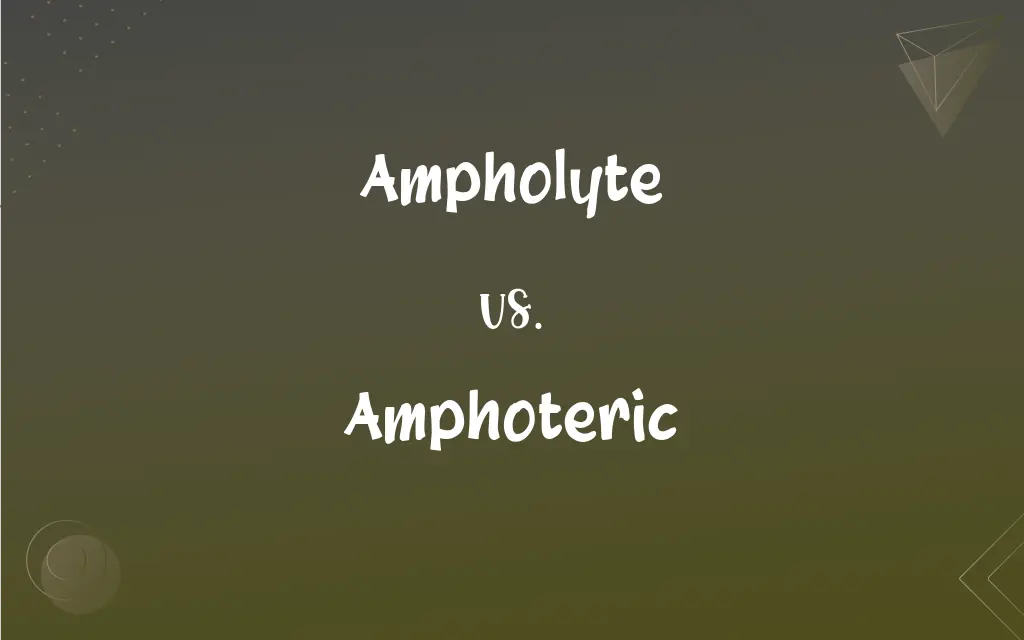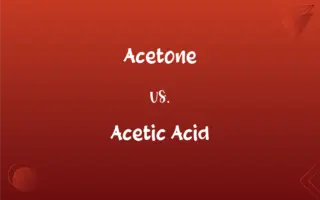Ampholyte vs. Amphoteric: What's the Difference?
Edited by Aimie Carlson || By Harlon Moss || Published on December 28, 2023
An ampholyte is a molecule that can act as both an acid and a base, while amphoteric refers to the general property of a substance being able to react as either an acid or a base.

Key Differences
An ampholyte is a specific type of molecule that possesses the ability to donate or accept protons, thereby acting as an acid or a base. Amphoteric, on the other hand, is a broader term used to describe the characteristic of a substance, not limited to molecules, that can behave as either an acid or a base.
In the context of ampholytes, these are often amino acids and proteins, which contain both acidic and basic functional groups. In contrast, the term amphoteric applies to various substances including metals and metalloids, like aluminum and zinc, which can form both acidic and basic oxides.
Ampholytes demonstrate their dual behavior in buffering solutions, maintaining pH stability. Amphoteric substances, in a broader sense, show their versatility in different chemical environments, reacting differently based on the pH of the surrounding medium.
Biochemically, ampholytes play crucial roles in cellular functions due to their dual reactive nature. Amphoteric materials, used in industrial processes, are valued for their ability to react with both acids and bases, leading to diverse applications.
The study of ampholytes is essential in understanding biological processes, like enzyme function. Amphoteric substances, by contrast, are studied in materials science and industrial chemistry for their unique reactive properties.
ADVERTISEMENT
Comparison Chart
Definition
A molecule that can act as both an acid and a base.
A property of a substance to react as either an acid or a base.
Examples
Amino acids, proteins.
Metals like aluminum, zinc.
Role in Solutions
Acts as a buffer, stabilizing pH.
Reacts based on the pH of the environment.
Applications
Important in biological processes.
Used in industrial and chemical processes.
Study Focus
Biochemistry and molecular biology.
Materials science and industrial chemistry.
ADVERTISEMENT
Ampholyte and Amphoteric Definitions
Ampholyte
An ampholyte is a molecule capable of acting as either an acid or a base.
Glycine, an amino acid, is an ampholyte because it can donate or accept a proton.
Amphoteric
The ability of a material to react chemically either as an acid or a base.
Amphoteric surfactants are used in personal care products due to their dual reactivity.
Ampholyte
A substance that possesses both acidic and basic properties.
In protein electrophoresis, ampholytes help establish a pH gradient.
Amphoteric
Amphoteric refers to a substance that can react as both an acid and a base.
Water is an amphoteric substance, as it can both accept and donate protons.
Ampholyte
A chemical compound that can react as both a proton donor and acceptor.
Ampholytes are used in buffer solutions to maintain the desired pH.
Amphoteric
Characteristic of a chemical that can function as either a proton donor or acceptor.
Aluminum oxide is amphoteric, reacting with both acids and bases.
Ampholyte
A dual-nature molecule, exhibiting characteristics of both acids and bases.
Zwitterions, like many ampholytes, contain both positively and negatively charged groups.
Amphoteric
A property of a substance to exhibit both acidic and basic behavior.
In chemistry, amphoteric compounds are versatile reactants in various reactions.
Ampholyte
A compound that can either release or bind hydrogen ions.
Ampholytes play a critical role in the body's acid-base homeostasis.
Amphoteric
Pertaining to substances that have the ability to form salts with both acids and bases.
Zinc oxide is an amphoteric oxide used in many industrial processes.
Ampholyte
(chemistry) An amphoteric electrolyte
Amphoteric
Having the characteristics of an acid and a base and capable of reacting chemically either as an acid or a base.
Amphoteric
(chemistry) Having the characteristics of both an acid and a base, and capable of reacting as either; amphiprotic.
Amphoteric
Partly one and partly the other; neither acid nor alkaline; neutral.
Amphoteric
Relating to or containing an alkali; having a pH greater than 7;
Alkaline soils derived from chalk or limestone
FAQs
Are all amphoteric substances ampholytes?
No, amphoteric substances include a broader range of materials, not just molecules.
What is an ampholyte?
A molecule that can act as both an acid and a base.
What does amphoteric mean?
A property of a substance to react as either an acid or a base.
How do ampholytes function in biological systems?
They help in processes like enzyme function and pH regulation.
Can an ampholyte be a simple molecule?
Yes, simple molecules like amino acids can be ampholytes.
Can ampholytes be used in industrial processes?
Yes, particularly in buffering solutions.
Why is the amphoteric nature important in chemistry?
It allows substances to react in versatile ways, useful in various chemical reactions.
Can ampholytes change their charge?
Yes, depending on the pH of the environment.
Is water an ampholyte?
No, water is amphoteric but not an ampholyte.
What are common examples of amphoteric substances?
Metals like aluminum and zinc, and some metal oxides.
Are amphoteric substances always solids?
No, they can be in various states, including liquids and gases.
Can amphoteric substances be catalysts?
Yes, in reactions involving both acids and bases.
Do ampholytes always contain both positive and negative charges?
Often, as in zwitterions, but not always.
How are ampholytes used in electrophoresis?
They help establish a pH gradient for protein separation.
What role do ampholytes play in pH buffering?
They stabilize pH by accepting or donating protons.
Can an amphoteric substance be neutral?
Yes, depending on its chemical structure and the environment.
Are ampholytes always neutral in charge?
Not necessarily; their charge can vary depending on the pH.
How do amphoteric substances react with acids?
They can react to form salts or complexes.
Are all amino acids ampholytes?
Most amino acids are, due to their acidic and basic groups.
Is the concept of amphoteric limited to organic chemistry?
No, it applies to inorganic substances as well.
About Author
Written by
Harlon MossHarlon is a seasoned quality moderator and accomplished content writer for Difference Wiki. An alumnus of the prestigious University of California, he earned his degree in Computer Science. Leveraging his academic background, Harlon brings a meticulous and informed perspective to his work, ensuring content accuracy and excellence.
Edited by
Aimie CarlsonAimie Carlson, holding a master's degree in English literature, is a fervent English language enthusiast. She lends her writing talents to Difference Wiki, a prominent website that specializes in comparisons, offering readers insightful analyses that both captivate and inform.
































































